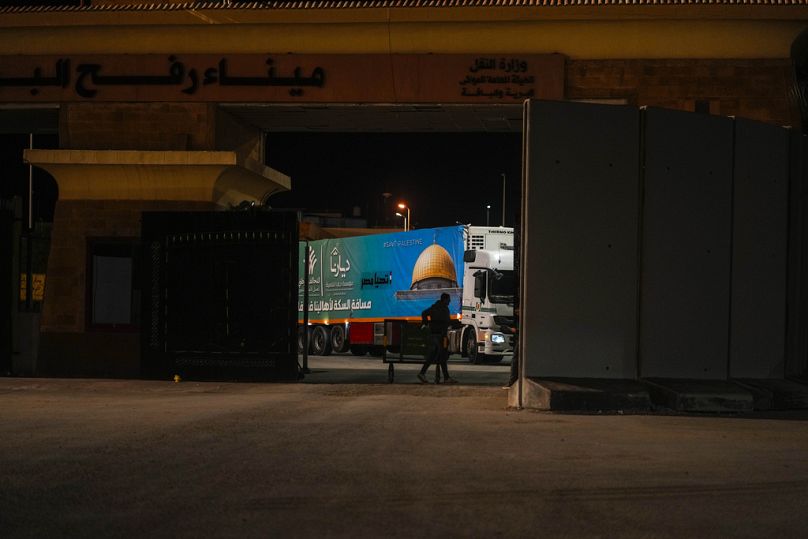The embrace of Russian state interests in spreading anti-Western and anti-Ukrainian narratives by Egyptian punditry is just one of the peculiarities surrounding al-Sisi’s new term, Nathaniel Greenberg writes.
Little surprise surrounded the recent elections in Egypt, where the incumbent President and former Defence Minister Abd al-Fatah al-Sisi swept to power with a reported 89.6% of the vote.
 ADVERTISEMENT
ADVERTISEMENT
 ADVERTISEMENT
ADVERTISEMENT
While al-Sisi ran on a host of promises, including plans to lift Egypt out of its ongoing economic crisis, the geopolitics of the wars in Ukraine and Palestine coloured the election in ways that were also unsurprising.
“Down with Israel. No displacement or rehoming," was the chant attributed to “angry protests in all Egyptian governorates,” according to Egypt Today, one of the country’s semi-official English-language news outlets.
In advance of an 18 October meeting with US President Joe Biden, al-Sisi declared: "What is happening now in Gaza is an attempt to force civilian residents to take refugee and migrate to Egypt, which should not be accepted.”
Where did the claim come from?
Mystery surrounded the origins of the claim, which, in the brutal displacement south of Egypt’s besieged neighbours, appeared virtually self-evident.
But on 23 October, the Russian-state news behemoth, RT Arabic, provided a credible source for the rumour. A right-wing think tank with ties to the Israeli Ministry of Intelligence had published a white paper alluding to the plot that was now materialising on the ground.
In typical propagandist fashion, the RT story replicated across dozens of affiliated websites within the Russo-Arabic media sphere as well as other major Arabic satellite networks.
The convenient factor that none of the syndicating sources attributed their findings to the original RT item lent credence to the appearance of consensus.
Ostensible vindication of the information, also promulgated one week later by the Israeli outlet Local Call which disclosed a separate, leaked document, apparently from Israel’s Ministry of Intelligence, further compounded the veritas of al-Sisi’s powerful campaign pitch.
The Local Call piece and the leaked white paper also gained traction in Western media.
Are conspiratorial machinations driving the narrative?
But, in fact, it was just days following the attacks in Israel that Russian-aligned propaganda in Egypt began amplifying the narrative that a secret accord between the Muslim Brotherhood, Israel and the US promised the relocation of the people of Gaza to the Sinai peninsula.
No surprise as the triad had long occupied a central role in contemporary Egyptian folklore.
The counterrevolutionary movement known as Tamarod that first carried al-Sisi to power in 2014 was motivated in part by the same narrative and through much the same chain of influence.
Via new media platforms like X, Telegraph and YouTube, obscure but viral hubs like "Egypt’s Channel", run by a former Egyptian state-media head, spun elaborate scenarios about the "Sinai plot", which now also involved the government of Ukraine.
While leaving the actions or funding for Hamas unexamined, the conspiratorial machinations drove pro-Sisi demonstrators to the streets and further inflamed seemingly tangential conflicts like the ongoing struggle for power in Libya, where the Kremlin is actively pursuing to overthrow the Tripoli government and empower their preferred candidate, Seif al-Qadafi.
Egyptian state interests should come first — but will they?
In the end, the embrace of Russian state interests by Egyptian punditry is just one of the peculiarities surrounding al-Sisi’s new term.
As the regime ages, one would hope that Egyptian state interests will someday trump those of Russia or any other foreign power.
The prospect for now, however, seems unlikely, as more often than not in Egypt history tends to repeat itself, if often in the form of farce.
Nathaniel Greenberg is Associate Professor of Arabic at George Mason University and the author of "How Information Warfare Shaped the Arab Spring".
At Euronews, we believe all views matter. Contact us at view@euronews.com to send pitches or submissions and be part of the conversation.












